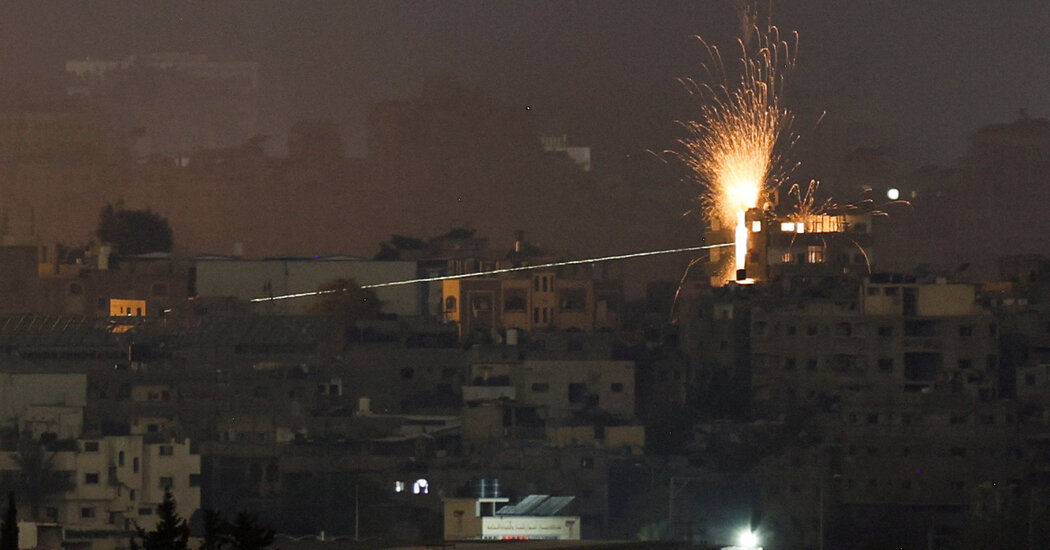
As the Israeli military ramped up pressure on what it calls Hamas' last stronghold in Gaza, Sunday's fighting elsewhere in the Palestinian enclave led to warnings that the militants could remain a force for a long time to come.
Close-quarters fighting between Hamas fighters and Israeli troops raged in parts of northern Gaza over the weekend, both sides said Sunday, even as the world's attention was largely focused on the southern city of Rafah, where Israel stepped up military operations last week.
It has become a familiar scenario in the Gaza Strip over the course of the seven-month war: After pitched battles, Israel declares an area free of Hamas, then returns after the militants have rebuilt their forces.
On Sunday, Secretary of State Antony J. Blinken said he was concerned that Israel's failure to establish a model for governing Gaza means its victories may not be “sustainable” and be followed by “chaos, anarchy and, ultimately, by Hamas again.”
Blinken's warning came as the Israeli army said its soldiers had “eliminated a number” of fighters in the Zeitoun neighborhood of Gaza City. In nearby Jabaliya, where civilians were ordered to evacuate Saturday, troops responded overnight after fighter jets struck more than two dozen targets, the military said. The operation, it says, was “based on intelligence information regarding Hamas' attempts to reorganize.”
Hamas said on Sunday that its fighters were engaged in “fierce clashes” with Israeli soldiers near Jabaliya and that fighters had fired large-caliber mortar shells at Israeli forces in Zeitoun.
Neither claim can be independently verified.
Palestine TV, a network affiliated with the Palestinian Authority, a Hamas rival based in the Israeli-occupied West Bank, broadcast footage showing civilians, many of them women and children, fleeing northern Gaza. Some were on foot, others on bicycles, in cars or piled onto carts pulled by donkeys.
“I am deeply saddened by the rapid deterioration of conditions in Gaza,” U.N. human rights chief Volker Türk said in a statement on the fighting in the north.
In Rafah, the southernmost city where more than a million Palestinians have fled for safety since the war began in October, Gazans were once again on the move, fearful that Israel was about to invade the city with all its might. his strengths.
Israel has been under intense international pressure – including from the United States, its closest ally – not to launch a full-scale invasion of Rafah. The Israelis say they are determined to root out the militants who led the October 7 attacks on Israel.
But top Hamas leaders in the Gaza Strip, including Yahya Sinwar, are not withholding information in Rafah, according to American officials, that could undermine the Israeli rationale for major military operations in the city.
US officials say Israeli intelligence agencies agree with the American assessment. The two countries' spy agencies believe that Mr. Sinwar most likely never left the tunnel network under Khan Younis, a major city in the North, according to American officials. The American officials spoke on condition of anonymity to discuss sensitive intelligence assessments.
Nonetheless, Israel increased pressure on Rafah.
The main United Nations agency helping Palestinians in Gaza said Sunday morning that around 300,000 people had fled Rafah last week. Another organisation, the World Food Programme, warned that a full-scale invasion of the city would be “catastrophic”. Blinken reiterated in a phone call to Israeli Defense Minister Yoav Gallant that the United States is against such an operation.
Gaza's largest telecommunications company said Sunday that internet service is disrupted in parts of southern Gaza due to Israeli military operations. And Doctors Without Borders said it had begun transferring the last 22 patients from one hospital, the Rafah Indonesian Field Hospital, to other facilities because they “could no longer guarantee their safety.”
On Sunday, Israeli citizens observed Memorial Day, a national day of mourning that took on greater intensity this year. At 8pm, a minute-long siren sounded across the country, stranding pedestrians in the streets and blocking traffic.
Even in a normal year, the commemoration of soldiers and victims of terrorist attacks is sacrosanct in Israel, a small country where many know someone killed or injured as a result of the decades-long Israeli-Palestinian conflict.
About 1,200 people were killed and 250 taken hostage on October 7, Israeli authorities say. Since Israel launched its invasion of Gaza, at least 272 soldiers have been killed, the military says. More than 34,000 Palestinians have been killed in the war and most Gazans have been forced to flee their homes, Gaza officials say.
Liam Stack reported from Tel Aviv, Aaron Boxerman from Jerusalem, e Eric Nagourney From New York. Reporting contribution was provided by Julian E. Barnes, Adam Entous, Mike Ives AND Edward Wong.
